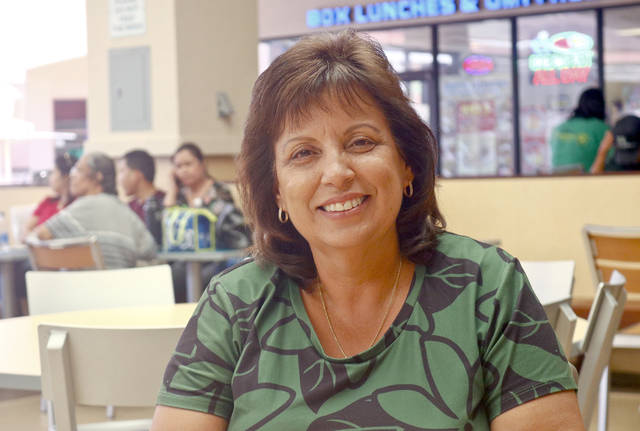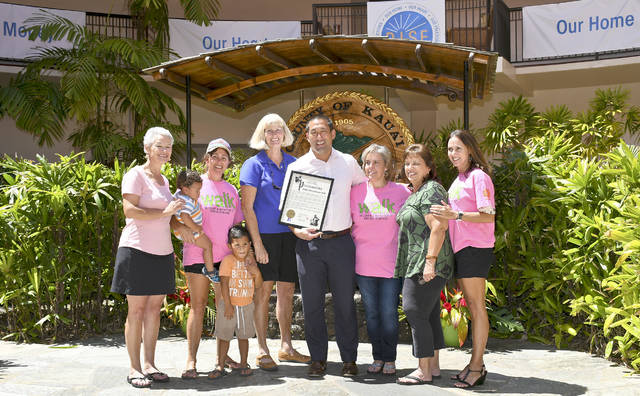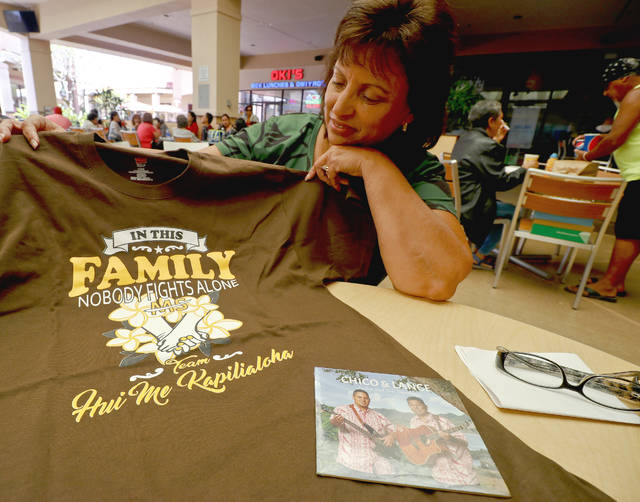LIHUE — Cindy Correa Edralin was catching her breath following a series of doctor appointments and therapy sessions, Monday at the Kukui Grove Center food court area.
“I’m forgetting a lot of things,” Edralin, who was diagnosed with Multiple Sclerosis 16 years ago, said. “I have to write things down to remember.”
One of the things she doesn’t need to write down is the MS Walk (on Kauai, it is the “Sunset Stroll”) that takes place, Saturday when registration opens the fundraising festivities at 3:30 p.m. at the Kapaa Beach Park along Ke Ala Hele Makala‘e (multi-use path).
“They’ll have the poker game — but you don’t need to run all over — just table to table,” said Edralin. “Last year, JoAnn Yukimura had the best hand. And, there is the silent auction while teams gather before the walk along the path. After the walk, there is dinner served up by Duke’s.”
Edralin unveiled the special team shirt — Hui Me Kapilialoha — that was designed by her brother, Kirk Correa, that she and her team will be wearing when the festivities get underway, Saturday.
“Hui Me Kapilialoha means ‘team with bonding love,’” Edralin said. “The theme is ‘in this family, Nobody Fights Alone.’ We’re all family — my MS sisters, family, and everyone!”
The conversation brought back memories of when she was first diagnosed with MS in 2003, an unpredictable disease that affects a person’s central nerve system that consists of the brain, spinal cord, and optic nerves.
“I thank Dr. Ronald Fujimoto for being here, today,” Edralin said. “Dr. Fujimoto was my physician for many years, and I went to see him one day because my legs had a weird feeling with tingling and numbness. He checked me and didn’t know what it was.”
“The following day, I felt worse. Now, I felt more tingling and numbness that started from my feet and worked its way up to my knees. My friends talked me into going back to see Dr. Fujimoto. I could hardly walk.”
“Dr. Fujimoto called a neurologist — Dr. Bjornskov — and as I waited, I could hear his concern as he spoke with the neurologist. I was admitted into the hospital, and from his office to the hospital, I could no longer feel my legs. I was paralyzed from the waist down. I wasn’t scared, but was, like, what the heck is happening to me.”
“It was rough in the hospital — every day when the neurologist came to check me, she would poke my feet, and I couldn’t feel anything. Following several days, I started to have a little feeling, again and when I could walk, they released me.”
More tests and a second opinion followed at the St. Francis Hospital.
“They did a MRI and MRA on me,” Edralin said. “When the results came back, I was diagnosed with MS. The specialist told me that although I was first misdiagnosed with Guillain-Barre Syndrome, the treatment I was given was the same treatment as when you have an MS attack. That saved me from getting worse.”
Recovery took three to four months and Edralin was able to regain strength in her legs and was able to walk, again.
“But I had to take early retirement because the work I was doing had too much stress,” Edralin said. “When I look back, I remember my husband dropping me off at my parents house before he went to work. They were so patient with me and took me on slow walks around their neighborhood. I am so blessed to have such a wonderful family — from my parents, my husband Chico, my daughter Shantel and her family, my son Lance and his family, and my brothers, Kirk and Jerry and their families. There are my many friends who were there for me — and still are. I pray a lot, and I believe that my faith and the tremendous support I got from everyone is what pulled me through.”
Edralin said when her team — her family — take the walk, Saturday, it will be the first time they’ll be doing it without her father.
“Some days are rough, but you can’t give up,” she said. “You have to be a fighter, and have faith. With God’s help, I plan on being here for a long time.”
The MS Walk serves as a fundraiser in observance of MS Week to promote awareness of the disease that affects more than a million people in the United States.
“Although there is no cure for MS, there are medications that are available to minimize the chances of an attack,” Edralin said. “There are no guarantees, but anything is better than nothing.”




